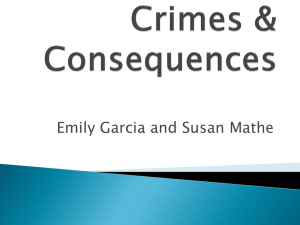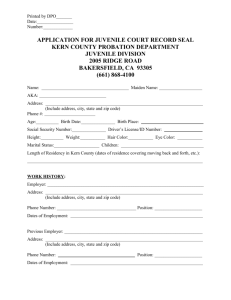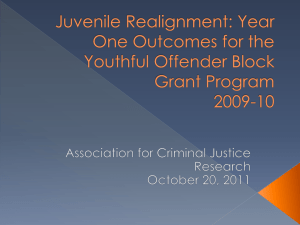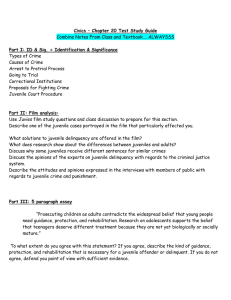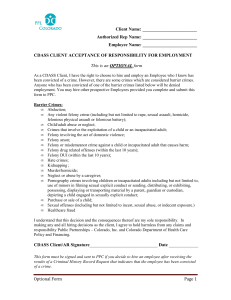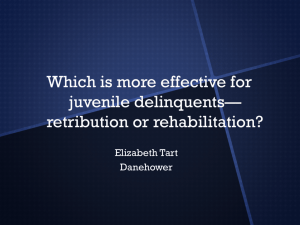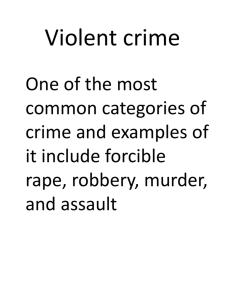I've Been Found Delinquent By The Court. How Will...
advertisement
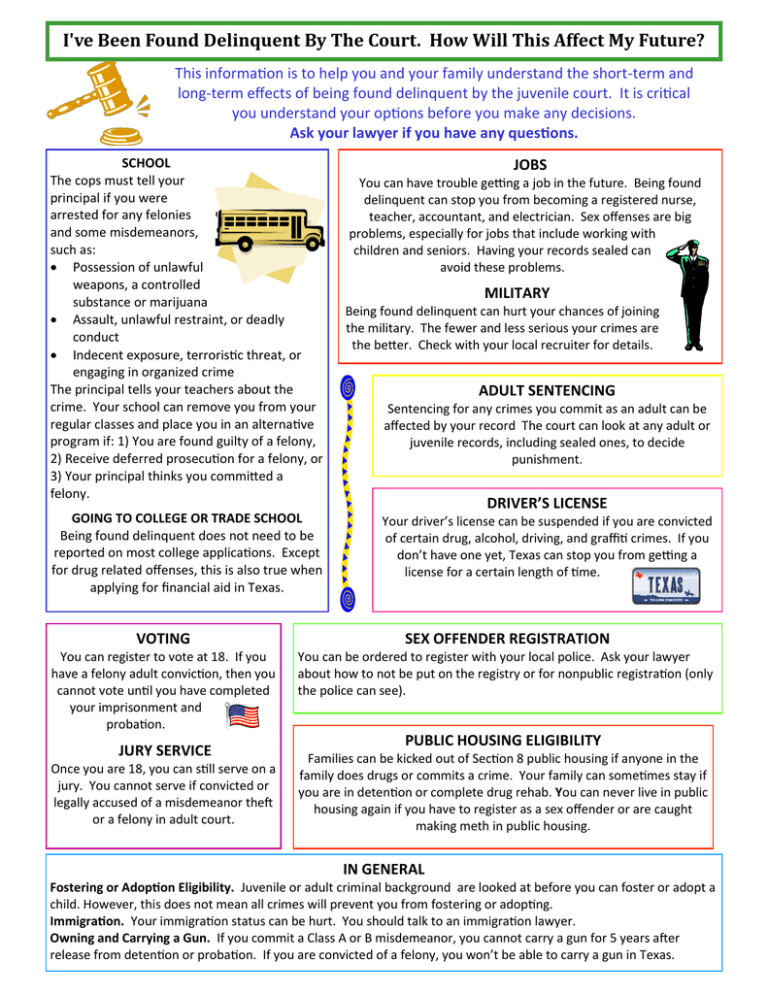
I've Been Found Delinquent By The Court. How Will This Affect My Future? This information is to help you and your family understand the short-term and long-term effects of being found delinquent by the juvenile court. It is critical you understand your options before you make any decisions. Ask your lawyer if you have any questions. SCHOOL The cops must tell your principal if you were arrested for any felonies and some misdemeanors, such as: Possession of unlawful weapons, a controlled substance or marijuana Assault, unlawful restraint, or deadly conduct Indecent exposure, terroristic threat, or engaging in organized crime The principal tells your teachers about the crime. Your school can remove you from your regular classes and place you in an alternative program if: 1) You are found guilty of a felony, 2) Receive deferred prosecution for a felony, or 3) Your principal thinks you committed a felony. GOING TO COLLEGE OR TRADE SCHOOL Being found delinquent does not need to be reported on most college applications. Except for drug related offenses, this is also true when applying for financial aid in Texas. JOBS You can have trouble getting a job in the future. Being found delinquent can stop you from becoming a registered nurse, teacher, accountant, and electrician. Sex offenses are big problems, especially for jobs that include working with children and seniors. Having your records sealed can avoid these problems. MILITARY Being found delinquent can hurt your chances of joining the military. The fewer and less serious your crimes are the better. Check with your local recruiter for details. ADULT SENTENCING Sentencing for any crimes you commit as an adult can be affected by your record The court can look at any adult or juvenile records, including sealed ones, to decide punishment. DRIVER’S LICENSE Your driver’s license can be suspended if you are convicted of certain drug, alcohol, driving, and graffiti crimes. If you don’t have one yet, Texas can stop you from getting a license for a certain length of time. VOTING SEX OFFENDER REGISTRATION You can register to vote at 18. If you have a felony adult conviction, then you cannot vote until you have completed your imprisonment and probation. You can be ordered to register with your local police. Ask your lawyer about how to not be put on the registry or for nonpublic registration (only the police can see). JURY SERVICE Once you are 18, you can still serve on a jury. You cannot serve if convicted or legally accused of a misdemeanor theft or a felony in adult court. PUBLIC HOUSING ELIGIBILITY Families can be kicked out of Section 8 public housing if anyone in the family does drugs or commits a crime. Your family can sometimes stay if you are in detention or complete drug rehab. You can never live in public housing again if you have to register as a sex offender or are caught making meth in public housing. IN GENERAL Fostering or Adoption Eligibility. Juvenile or adult criminal background are looked at before you can foster or adopt a child. However, this does not mean all crimes will prevent you from fostering or adopting. Immigration. Your immigration status can be hurt. You should talk to an immigration lawyer. Owning and Carrying a Gun. If you commit a Class A or B misdemeanor, you cannot carry a gun for 5 years after release from detention or probation. If you are convicted of a felony, you won’t be able to carry a gun in Texas. What Can I Do About My Juvenile Record? WHEN DO POLICE RECORDS BEGIN? The police can get information from you while holding you and put it into the system. Even if charges are not filed against you, you should have a lawyer check to make sure the police deleted any information about you from their files. You can be photographed and fingerprinted without permission of the court if arrested for a crime punishable by jail time. WHEN DO JUVENILE RECORDS BEGIN? They begin as soon as you are detained by the police. Once you are taken in you must wait for your hearing, which must happen by the 2nd workday after the police take you in. The hearing decides whether you should be held longer or released to an adult. If your hearing does not happen within the 2nd workday, the records must be destroyed. If an agreement can be reached without a hearing, or you are placed in a first offender program, the records must be destroyed within 90 days of successful completion of the program. NOTIFICATION OF THE EFFECTS The juvenile court judge must tell you and your family about the effects of court decisions. A Texas Youth Commission employee must tell you and your family as well as give you a paper about the possible effects when you arrive. When you leave the juvenile system, they must give you information about who can see your record once you become an adult. AUTOMATIC RESTRICTION TO ACCESS Juvenile records are confidential (secret), but cops, lawyers, and probation officers can see them, and some employers, schools, and licensors can too. Texas has an automatic restriction program that limits who can see your records to criminal justice groups. You can get this restricted access once you turn 19 if you have not committed any jailable crime after turning 17. However, once the records are restricted, if you commit a jailable crime after the age of 19, the records will become unrestricted. While restricted, any agency with your records must say the record “does not exist” if asked by employers, schools, or others. You can say “no” if asked if you have committed a juvenile crime. SEALING JUVENILE ARREST & COURT RECORDS The only way to stop people from seeing your juvenile record is record sealing. It is not free. You need to hire a lawyer with record sealing experience. If the court seals your records, your crime is treated like it never happened. All agencies must say, “no record exists,” and you can say, “no,” if asked about your record. Your record can be unsealed if you later commit a jailable offense, but before that is done you must be given notice and a hearing. If found not guilty or the charge is dismissed, then your record must be sealed immediately. If you committed a misdemeanor, the court must seal the records 2 years after the final discharge, if you have not been convicted of anything else and have no charges pending. If you committed a felony, the court does not have to seal the record. You can hire an attorney and have your record sealed if you are at least 21, are not in adult court, the record was not used in the punishment part of a criminal (adult) proceeding, and you have not been convicted of another felony since turning 17. If you are part of a court drug program, your record could be automatically sealed. Youth who get: 1) a sentence that goes into their adult years, 2) were sent to adult court, 3) are on a sex offender registry, 4) have criminal gang-related records, or 5) are considered habitual (many times) offenders, cannot have their record sealed or automatically restricted. EXPUNGING RECORDS The Justice of the Peace (J. P.) Court can expunge (erase) your juvenile records for non-felony, non-jailable misdemeanor crimes, if it has been over 5 years since your 16th birthday, and you have not been convicted of a felony. FOR MORE INFORMATION Check out www.beforeyouplea.com or www.law.uh.edu/center4clp or contact the Center for Children, Law & Policy at 713-743-1967 or Center4CLP@gmail.com.
